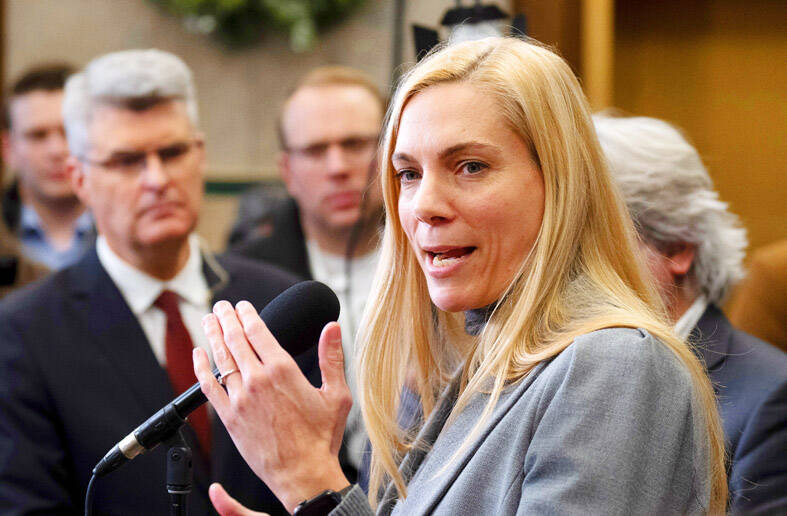Canada’s print media is to receive nearly two-thirds of an annual C$100 million (US$74.64 million) payment from Google to the country’s news outlets in exchange for distribution of their content, the federal government announced on Friday.
At the end of last month, after months of negotiations, Ottawa and Google announced a “historic” agreement, in which the tech giant would pay Canadian media companies compensation for the loss of advertising revenue.
“The share that television and radio will receive is capped at 30 percent, that of CBC/Radio-Canada [Canadian Broadcasting Corp] at 7 percent, which leaves the remaining 63 percent for the written press,” a federal official told journalists at a briefing.

Photo: AP
Most of the payout would go to the print media because it is “really dependent” on online platforms to distribute its content, the official added.
“Canada has accomplished something historic,” Minister of Canadian Heritage Pascale St-Onge told reporters, adding that “newsrooms are experiencing a crisis which affects journalism, a foundation of our democracy.”
“As part of the deal, Google provided assurances that Canadian news outlets will be treated fairly in comparison with deals it might strike with news media in other countries,” Radio Canada International reported on Friday.
“The federal government said that if news outlets in other countries strike a better deal with Google, the company would go back to the federal government with a view to resolving any concerns,” it added.
The agreement between Canada and Google is part of the Online News Act, which aims to support the struggling Canadian news sector, which has seen a flight of advertising dollars and hundreds of publications closed in the past decade.
The deal goes into effect on Tuesday.
Facebook’s parent company, Meta, which is also affected by the new legislation, still opposes the text, which it called “fundamentally flawed.”
“We will continue to push Meta, that makes billions of dollars in profits, even though it is refusing to invest in the journalistic rigor and stability of the media,” Canadian Prime Minister Justin Trudeau told reporters in Vancouver.
Meta said it will stick to its decision.
“News outlets choose to use our free services because it helps their bottom line, and today’s release of final regulations does not change our business decision,” said Rachel Curran, head of public policy for Meta Canada.
Since Aug. 1, Facebook and Instagram have blocked news content in Canada to avoid having to compensate media companies.
St-Onge said the Canadian Radio-television and Telecommunications Commission would “pay close attention to Facebook and Meta” as part of its enforcement.
Additional reporting by Reuters and staff writer

CRITICAL MOVE: TSMC’s plan to invest another US$100 billion in US chipmaking would boost Taiwan’s competitive edge in the global market, the premier said The government would ensure that the most advanced chipmaking technology stays in Taiwan while assisting Taiwan Semiconductor Manufacturing Co (TSMC, 台積電) in investing overseas, the Presidential Office said yesterday. The statement follows a joint announcement by the world’s largest contract chipmaker and US President Donald Trump on Monday that TSMC would invest an additional US$100 billion over the next four years to expand its semiconductor manufacturing operations in the US, which would include construction of three new chip fabrication plants, two advanced packaging facilities, and a research and development center. The government knew about the deal in advance and would assist, Presidential

‘DANGEROUS GAME’: Legislative Yuan budget cuts have already become a point of discussion for Democrats and Republicans in Washington, Elbridge Colby said Taiwan’s fall to China “would be a disaster for American interests” and Taipei must raise defense spending to deter Beijing, US President Donald Trump’s pick to lead Pentagon policy, Elbridge Colby, said on Tuesday during his US Senate confirmation hearing. The nominee for US undersecretary of defense for policy told the Armed Services Committee that Washington needs to motivate Taiwan to avoid a conflict with China and that he is “profoundly disturbed” about its perceived reluctance to raise defense spending closer to 10 percent of GDP. Colby, a China hawk who also served in the Pentagon in Trump’s first team,

SEPARATE: The MAC rebutted Beijing’s claim that Taiwan is China’s province, asserting that UN Resolution 2758 neither mentions Taiwan nor grants the PRC authority over it The “status quo” of democratic Taiwan and autocratic China not belonging to each other has long been recognized by the international community, the Mainland Affairs Council (MAC) said yesterday in its rebuttal of Beijing’s claim that Taiwan can only be represented in the UN as “Taiwan, Province of China.” Chinese Minister of Foreign Affairs Wang Yi (王毅) yesterday at a news conference of the third session at the 14th National People’s Congress said that Taiwan can only be referred to as “Taiwan, Province of China” at the UN. Taiwan is an inseparable part of Chinese territory, which is not only history but

INVESTMENT WATCH: The US activity would not affect the firm’s investment in Taiwan, where 11 production lines would likely be completed this year, C.C. Wei said Investments by Taiwan Semiconductor Manufacturing Co (TSMC, 台積電) in the US should not be a cause for concern, but rather seen as the moment that the company and Taiwan stepped into the global spotlight, President William Lai (賴清德) told a news conference at the Presidential Office in Taipei yesterday alongside TSMC chairman and chief executive officer C.C. Wei (魏哲家). Wei and US President Donald Trump in Washington on Monday announced plans to invest US$100 billion in the US to build three advanced foundries, two packaging plants, and a research and development center, after Trump threatened to slap tariffs on chips made